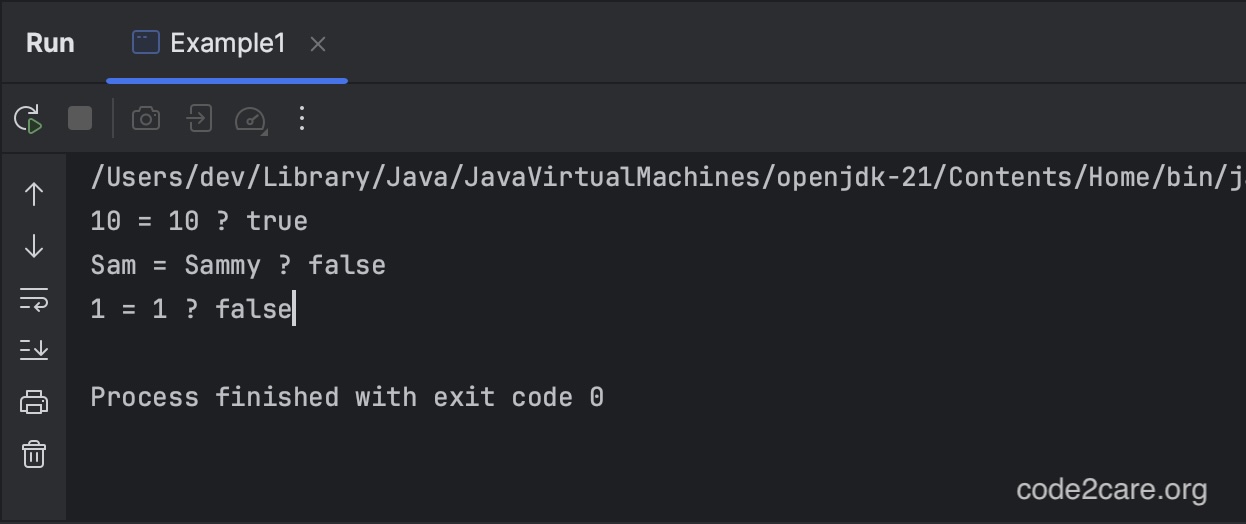In Java Generics, like Generic Classes and Interfaces we can have Generic Methods with their own type parameters.
Example 1: Compare two values
public class Example1 {
public <T> boolean areEqual(T value1, T value2) {
return value1.equals(value2);
}
public static void main(String[] args) {
Example1 example = new Example1();
int num1 = 10;
int num2 = 10;
boolean isEqual1 = example.areEqual(num1, num2);
System.out.println(num1 + " = " + num2 + " ? " + isEqual1);
String str1 = "Sam";
String str2 = "Sammy";
boolean isEqual2 = example.areEqual(str1, str2);
System.out.println(str1 + " = " + str2 + " ? " + isEqual2);
String val1 = "1";
int val2 = 1;
boolean isEqual3 = example.areEqual(val1, val2);
System.out.println(val1 + " = " + val2 + " ? " + isEqual3);
}
}
Example 2: Find First Occurrence of an Element in an Array
import java.util.List;
public class Example2 {
public <T> int findIndex(T[] array, T target) {
for (int i = 0; i < array.length; i++) {
if (array[i].equals(target)) {
return i;
}
}
return -1; //Not Found!
}
public <T> int countOccurrences(List<T> list, T target) {
int count = 0;
for (T item : list) {
if (item.equals(target)) {
count++;
}
}
return count;
}
public static void main(String[] args) {
Example2 example = new Example2();
Integer[] intArray1 = { 1, 2, 3, 4, 5 };
int index1 = example.findIndex(intArray1, 3);
System.out.println("Index of 3 in the array is: " + index1);
String[] strArray = { "China", "Japan", "India", "USA", "Canada" };
int index2 = example.findIndex(strArray, "USA");
System.out.println("Index of 'USA' in the array is: " + index2);
Integer[] intArray2 = { 5, 6, 2, 4, 6, 7, 8, 1, 9 };
int index3 = example.findIndex(intArray2, 17);
System.out.println("Index of 17 in the array is: " + index3);
}
}Example 3: Count Occurrences of an Element in a List
import java.util.Arrays;
import java.util.List;
public class Example3 {
public <T> int countOccurrences(List<T> list, T target) {
int count = 0;
for (T item : list) {
if (item.equals(target)) {
count++;
}
}
return count;
}
public static void main(String[] args) {
Example3 example = new Example3();
List<String> names = Arrays.asList("Japan", "China", "Japan", "Australia", "India", "Japan");
int count1 = example.countOccurrences(names, "Japan");
System.out.println("Occurrences of 'Japan' in the list: " + count1);
List<Integer> numbers = Arrays.asList(3, 4, 6, 9, 3);
int count2 = example.countOccurrences(numbers, 3);
System.out.println("Occurrences of '3' in the list: " + count2);
}
}Facing issues? Have Questions? Post them here! I am happy to answer!
Author Info:
Rakesh (He/Him) has over 14+ years of experience in Web and Application development. He is the author of insightful How-To articles for Code2care.
Follow him on: X
You can also reach out to him via e-mail: rakesh@code2care.org
More Posts related to Java,
- Get the current timestamp in Java
- Java Stream with Multiple Filters Example
- Java SE JDBC with Prepared Statement Parameterized Select Example
- Fix: UnsupportedClassVersionError: Unsupported major.minor version 63.0
- [Fix] Java Exception with Lambda - Cannot invoke because object is null
- 7 deadly java.lang.OutOfMemoryError in Java Programming
- How to Calculate the SHA Hash Value of a File in Java
- Java JDBC Connection with Database using SSL (https) URL
- How to Add/Subtract Days to the Current Date in Java
- Create Nested Directories using Java Code
- Spring Boot: JDBCTemplate BatchUpdate Update Query Example
- What is CA FE BA BE 00 00 00 3D in Java Class Bytecode
- Save Java Object as JSON file using Jackson Library
- Adding Custom ASCII Text Banner in Spring Boot Application
- [Fix] Java: Type argument cannot be of primitive type generics
- List of New Features in Java 11 (JEPs)
- Java: How to Add two Maps with example
- Java JDBC Transition Management using PreparedStatement Examples
- Understanding and Handling NullPointerException in Java: Tips and Tricks for Effective Debugging
- Steps of working with Stored Procedures using JDBCTemplate Spring Boot
- Java 8 java.util.Function and BiFunction Examples
- The Motivation Behind Generics in Java Programming
- Get Current Local Date and Time using Java 8 DateTime API
- Java: Convert Char to ASCII
- Deep Dive: Why avoid java.util.Date and Calendar Classes
More Posts:
- SharePoint Excel error - The workbook cannot be opened because it contains the following features that are not supported by Excel in the browser - SharePoint
- Rename git branch on Local and GitHub Remove using Command - Git
- Change SharePoint Online List Experience to New Experience from Classic - SharePoint
- List of Rust Cargo Commands - Rust
- Installation error: INSTALL_PARSE_FAILED_MANIFEST_MALFORMED - Android
- Find installed Gradle version command - Gradle
- [fix] MySQL cj jdbc CommunicationsException: Communications link failure - Java
- How to upload file programmatically to SharePoint Document Library using Server Object Model C# .Net - SharePoint